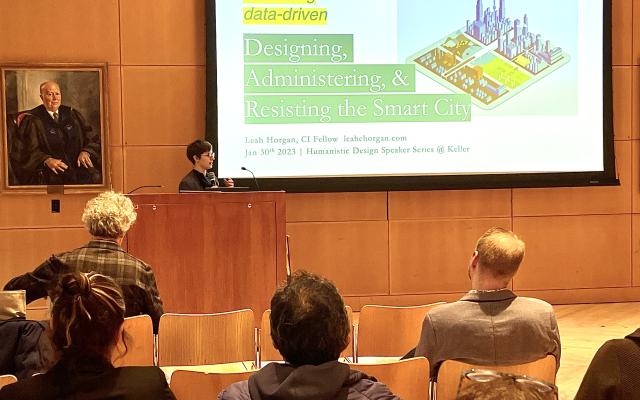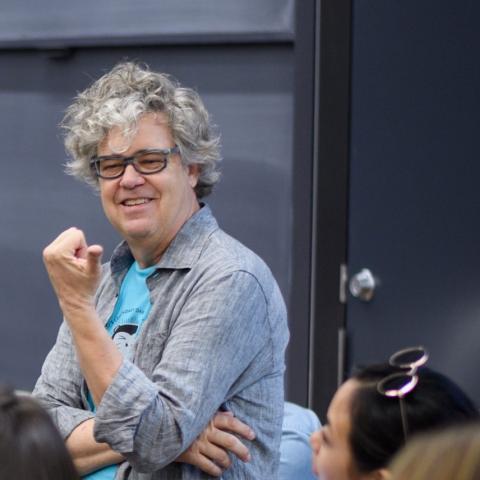
This week, the Keller Center launched the Humanistic Design speaker series, which focuses on the research, impact, and capacity of using humanistic design to untangle deep-rooted problems and inequities in society. Throughout the spring, the Center will bring scholars from outside the University to campus to discuss their work in humanistic design.
The series’ first presenter was Leah Horgan, a Fellow at Northeastern University whose work examines the intersection of technology, design, and urbanism. Horgan's stimulating and insightful talk chronicled her Ph.D. research and work on multiple civic initiatives for community betterment ranging from environmental issues to homelessness.
In her presentation, she called out the obstacles that datafication creates when working on ingrained, wicked problems and how data dashboards often distract resources from addressing the underlying crisis at hand.
"In discussing my work, which shows how enormous investments in smart and data-driven technologies in government are directed at containing the fallout from systemic harm rather than disrupting it, I hope we can start a conversation around designing in a way that encompasses rather than simplifies important socio-historical complexities and ultimately points us toward new ways of doing," stated Horgan.
James Wei Visiting Professor Ken Anderson is part of the brain trust of Keller Center faculty behind this series. In introducing Horgan to the audience of faculty, students, and staff Anderson commented that facing today's complex, wicked problems requires a robust partnership of the humanities, social sciences, science, technology, and engineering where the respective expertise will be united utilizing design practices.
"Progress to improve the human condition will fail without a deep understanding of human experiences, broad contexts, the multiplicity of relationships, politics, and cultures. Human-centered inquiry, sustainability, and social justice need to be baked into our thinking to develop the kind of solutions humanity needs and create our world's future leaders," said Anderson.
Horgan wowed Keller’s executive director Cornelia Huellstrunk with her presentation. "She shared many insightful comments, including those focused on our society's enamorment with datafication. She was right to say that datafication captures the fallout of systemic injustices rather than fundamentally disrupting inequitable systems. Those comments, among others in her talk, remind us why design perspectives are essential to innovation," said Huellstrunk.
Innovation is a core element of Keller's mission, but it must be equitable, just, and sustainable.
Horgan is now back home in Boston, continuing her work at the Wylie Environmental Data Justice Lab on a community-based relational geography project. Still, she reached out to share this comment, "It was wonderful to be invited to Princeton and participate in this essential speaker series. I found it a real joy to meet and chat with students after the talk, who were keen to think critically and ready to act on the pressing social issues raised in our discussion."
The next presenter in the Humanistic Design speaker series is Sarah Fox who will present her talk Patchwork: The Hidden Labor of AI Integration Within Essential Work on Tuesday, February 21 at 4:30 pm in the Friend Center Convocation Room. Register to attend Patchwork. These events are free and open to everyone.

